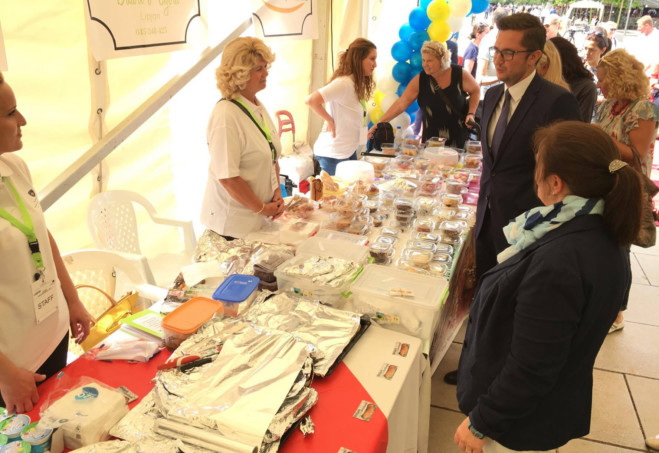Arbresha Berisha, owner of one of the local enterprises named “Magjja,” is one of the few women that owns a business in Kosovo. She has also helped to provide employment for other women through her business, which she opened at the end of 2016 in Llashtica village, nine kilometers from Gjilan. Employees prepare traditional dishes from all Albanian lands and deliver them to the market.
“Magjja” directly employed women from the village who were never before employed. In the beginning, six women from the village were hired to prepare food, and a driver was hired to transport the products.
The business was Berisha’s own initiative, using her own finances and the support of her husband, and no one else.
“We plan to have the support of USAID and other organizations, like we naturally expect from the government to give us solid support so that we can add our competing abilities to the market,” she says.
When it comes to hiring women in Kosovo, according to the Kosovo Statistics Agency, only 11.3% of women old enough to work are employed.
Habibe Berisha, chef in the new business mentioned above, is one of the women who thinks her job is a dream come true.
“I have never thought that I would work and get a paycheck from the comfort of my home,” she says, adding that she loves doing her job.
Official statistics conclude that only 18% of private companies in Kosovo are registered in the name of female owners. According to data of The Ministry of Trade and Industry, from over 43.000 registered businesses, only around 8.000 are women–owned.
Preparing food and delivering it is one of the most common businesses that women choose to open.
Azemine Hajrizaj is also one of the women who chose to prepare food as a career, contributing to growing businesses and employing women in Kosovo.
“I took this initiative seven years ago – I took some classes so that I am good at what I do. My job is not hard, on the contrary I have a lot of fun because it was my goal for a long time,” Hajrizaj says.
In the beginning she opened a hotel, but she had to close it because it wasn’t profitable. Now she works from home, answering the orders for cakes and sweets from her clients. She mainly bakes for Kosovo Radio and Television.
“Choco-Love,” in Lipjan, is another business that bakes and decorates cakes. Sisters Pranvera and Teuta Sadiku, students at the University of Prishtina, opened this business to follow their dream of being creative.
“We started the business on our own and it is something very special because in Lipjan, we are the only ones who decorate cakes and who get cake orders – we are one of a kind,” sisters Sadiku say.
They plan to move to a larger space in the near future, so they can expand their business, and hopefully get additional financial support.
According to a research study of the Riinvest Institute, conducted recently by the economist Lumir Abdixhiku, 81% of women old enough to work in Kosovo are not active; to be precise, 474.000 Kosovo women stay at home.
This report varies visibly when it comes to employed men. In contrast to women, only 39% of men are not active. From 19% of active women, only 12% are employed, to put it in other words four times less than employed men.
According to Abdixhiku’s research study, inequality extends further. For a job where men get paid 1 euro, women are paid 93 cents for the same job. This information was reported by 70% of respondents of a survey of Kosovo women.
Fatbardha Terpeza










